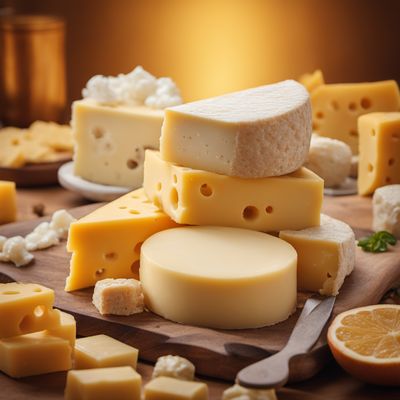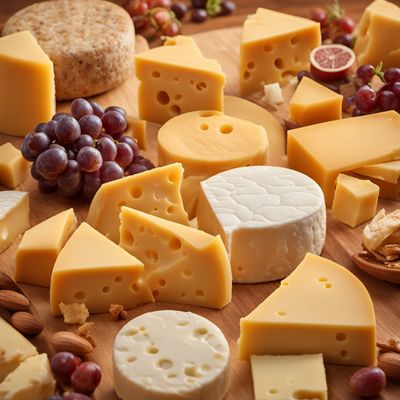
Ingredient
Cheese, bleu d'auvergne
The Blue Elegance
Cheese, Bleu d'Auvergne, is a semi-soft blue cheese with a creamy texture and a rich, tangy flavor. It is characterized by its blue veins and a slightly pungent aroma. This cheese is perfect for adding depth and complexity to salads, sauces, or enjoyed on its own with a crusty baguette.
Origins and history
Bleu d'Auvergne cheese originates from the Auvergne region in central France. It has a long history dating back to the mid-19th century when a local farmer accidentally discovered the blue mold in his cheese. Since then, it has become a beloved French cheese, known for its unique flavor and creamy texture.
Nutritional information
Bleu d'Auvergne cheese is a good source of calcium, protein, and vitamin B12. However, it is also high in saturated fat and sodium, so it should be consumed in moderation.
Allergens
Milk
How to select
When selecting Bleu d'Auvergne cheese, look for a cheese that is creamy and evenly marbled with blue veins. Avoid cheese with an ammonia-like smell or excessive mold growth. Opt for cheese that is well-packaged and stored at the proper temperature.
Storage recommendations
To maintain its freshness and prevent excessive mold growth, store Bleu d'Auvergne cheese in the refrigerator at a temperature of 35°F to 40°F (2°C to 4°C). Wrap it tightly in wax paper or aluminum foil to allow it to breathe. Consume within 1-2 weeks of opening for optimal flavor.
How to produce
Bleu d'Auvergne cheese is typically produced by artisanal cheese makers in France using traditional methods. However, it can also be made at home using pasteurized cow's milk, a blue mold culture, and specific aging techniques. It requires careful monitoring of temperature and humidity to achieve the desired flavor and texture.
Preparation tips
Bleu d'Auvergne cheese can be crumbled and used as a topping for salads, melted into sauces for pasta or steak, or enjoyed on a cheese board with fruits and nuts. It pairs well with honey, figs, pears, and walnuts, balancing the richness of the cheese with a touch of sweetness and crunch.
Substitutions
Gorgonzola, Roquefort
Culinary uses
Bleu d'Auvergne cheese is commonly used in French cuisine, particularly in dishes like salads, quiches, and gratins. It adds a bold and creamy flavor to sauces and dressings, elevating the overall taste of the dish.
Availability
France
More ingredients from this category

Cheese, fourme d'ambert
The Blue Jewel of French Cheeses

Cheese, monje picon
The Fiery Spanish Delight

Cheese, gorgonzola
The Bold and Creamy Delight: Gorgonzola Cheese

Cheese, valdeon
The Bold and Blue: Valdeon Cheese

Cheese, stilton
The Blue Jewel of British Cheeses

Cheese, shropshire blue
The Bold and Tangy Delight: Shropshire Blue Cheese

Cheese, cabrales
Cabrales Cheese: A Bold and Creamy Delight

Cheese, bleu de gex
"The Savory Delight: Unveiling the Secrets of Bleu de Gex Cheese"

Cheese, gamonedo
Gamonedo: The Spanish Delicacy

Cheese, roquefort
The Blue Elegance

